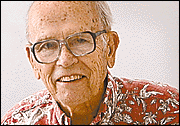Advertisement - Click to support our sponsors.


Hawaii’s World
SINCE Gotaro Ogawa, Japan's consul general in Hawaii, was born in 1943, he has seen his country recover dramatically from World War II defeat, move to the forefront of the economies of the world, invest worldwide and then implode in the 1990s due to recession. Diplomat sees
reforms in JapanAs a foreign service officer he has alternately watched developments from within Japan and abroad, the latter being from posts in France, the Philippines, Moscow as the USSR broke up, Korea and -- since 1998 --Honolulu.
He reviewed Japanese internal developments recently for the Japan-America Society of Hawaii, pointed to failures of old systems to meet new age challenges, reviewed proposals for change by recent prime ministers and ventured that within the public "the notion that 'we must change' is gathering force."
Japan -- because it is so wedded to its culturally rich past -- may not change as rapidly as some would like, he suggested, but already is embracing such things as:
More foreign investment, admission of more foreigners as residents, shifting away from powerful business groupings as the center of its economy, reining in the entrenched powers of government bureaucrats, relaxing the political grip of the long-dominant Liberal Democratic Party, leaning more on political democracy, allowing some of its failed companies to go bankrupt, turning in both industry and education to greater stress on individualism and innovation, accepting social changes that move away from lifetime employment and having businesses rather than families care for many aged persons.
These dramatic changes are coming surely, he believes, though not with breakneck speed.
Any one who doubts Japan's ability to do these things should look at the sparkling, innovative record of Sony Corp., first dreamed of by a young naval officer in the days of Japan's 1945 defeat, wedded to developing first-ever, consumer-friendly electronic projects, and a strong survivor in the days of Japan's difficulties.
OGAWA tends to date Japan's shift of direction to the 1996 election of Prime Minister Ryutaro Hashimoto and his bold program, called "Six Major Reforms." These met entrenched resistance, however, and led to Hashimoto's defeat in 1998.
Goto observed: "Mr. Keizo Obuchi, who succeeded Mr. Hashimoto, did not run away from the politically difficult, yet much-needed, reforms."
Obuchi instead spoke of "The Third Period of Great Reform" -- the first being the Meiji Restoration in the 19th century and the second being the post-World War II reforms. He told the Diet in 1998, "Many of the systems and the way of thinking that underpinned the breathtaking developments achieved by Japan in the post-war period are no longer appropriate for the times in which we live."
Financial scandals involving public servants and evidence of careless management practices, Consul General Ogawa said, have helped persuade the Japanese public that change is needed. Change now is supported, he believes, at the business, political and individual levels.
Prime Minister Obuchi was felled by a stroke this year and replaced by Yoshiro Mori, who is likely still to be guided by a bulky report prepared under Obuchi and issued in January.
Short-titled "Japan's Goals in the 21st Century," it identifies change-thwarting regulations, barriers and social conventions that leave many of Japan's latent strengths untapped. Consul General Ogawa seems confident they will be tapped in the future.
A.A. Smyser is the contributing editor
and former editor of the the Star-Bulletin
His column runs Tuesday and Thursday.